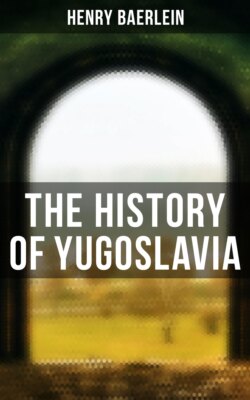Читать книгу The History of Yugoslavia - Henry Baerlein - Страница 30
На сайте Литреса книга снята с продажи.
THE CONSOLATION OF THOSE WHO REMAINED
ОглавлениеThose who preferred to take arms against the Turk had the choice either of leaving their country and entering the service of one which was at war with Turkey or else abiding in their own land, gathering in bodies of fifty to a hundred men, massacring as many Turks as possible, protecting and avenging their own people, sometimes being killed themselves, otherwise returning to the mountains every spring. The "heiduks," as they were called, had the people's unbounded devotion. Their achievements, perhaps a little touched with romance, were celebrated in the people's songs, and as it may be of interest to know what kind of song this people made in the period of uttermost depression, I give overleaf a couple that are concerned with heiduks; they are translations from a book of mine, The Shade of the Balkans, which is out of print.
I.
Go now and tell them,
Tell your companions
That, O Heiduk,
I have cut off your hands.
Cut away, cut away,
For I did curse them
When, O Buljuk Pasha,
They trembled on the gun.
Go now and tell them,
Tell your companions
That, O heiduk,
I have pricked out your eyes.
Prick away, prick away,
For I did curse them
When, O Buljuk Pasha,
They failed along the gun.
Go now and tell them,
Tell your companions
That, O heiduk,
I have hacked off your head.
Hack away, hack away,
For I did curse it
When, O Buljuk Pasha,
It compassed not your end.
II.
O Mechmed,[23] my beloved son, Have you come wounded back to me? Where is your pipe and your heiduk garb? —Ask me not, ask me not. Ask me rather where are my comrades. With six hundred I went to the mountains— Six of them live and brought me hither, Brought me though themselves were wounded. A little time and I must die— Call everyone of those I love, For I would take my leave of them.
When all were come young Mechmed said:
Mother, how long will you mourn for me?
—Till I step down to you in darkness.
Father, how long will you mourn for me?
—Till the raven's wing is white
And I see grapes on the willow-tree.
Sisters, how long will you mourn for me?
—Till we have babes to sing asleep.
How long will you mourn, my beloved?
—Till I go down among the flowers
And bring a nosegay back for him.
The Turk had thrown aside any toleration he started with. The Patriarchate of Peć, which they had for a time left intact, was now abolished and was not again permitted until 1557, when its re-establishment was due to the efforts of Mehemet Sokolović, the grand vizier from Bosnia, who raised to the Patriarchate his brother the monk Macarius. Every school in Serbia and Bulgaria was closed, so that no teaching could be given anywhere save in the monasteries; it is said to be a fact—I have it from Dr. Zmejanović, lately Bishop of Veršac—that when Kara George, the beloved and illiterate heiduk, made his first insurrection, there were, in addition to the monks, precisely eight individuals in Serbia—their names are recorded—who could read and write. Thus the absence of printing-presses was not greatly felt: in Bulgaria there was now no press at all, in Serbia a few prayer-books were roughly printed in the monasteries; but in the sixteenth century the monks, for the copying of these books, had reverted to the use of pen and ink.
There had been in the bygone days, in the empires of Simeon and Dušan, for example, a privileged class, commonly called an aristocracy, which as elsewhere had arisen from the people having been obliged to submit themselves to military discipline. … And it was in those dreary days when all the raia felt themselves as brothers[24] that the Serb and Bulgar planted that democracy which flourishes among them now. They saw what dangers threatened in the towns. Vuk Karajič, the reformer of the Serbian language, tells of certain merchants there who, by assuming Turkish apparel and customs, came to be no longer counted as Serbs. And more numerous by far were the townsfolk, nobles and merchants and others, who went to live among the countryfolk and intermarried with them, and produced a people which is better described not as a democracy, but as an aristocracy.
